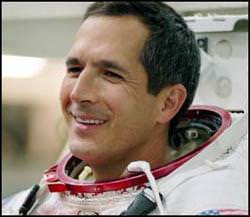Former NASA astronaut John Herrington has resigned from the commercial space company Rocketplane Global, Inc. Herrington left NASA in 2005 to join Rocketplane as vice president and director of flight operations. He was slated to pilot the company’s passenger-carrying suborbital XP spaceplane. His resignation was effective on December 21, 2007.
Herrington said he plans to continue working in the commercial space industry, because he believes “commercial space is the next great adventure in aerospace.” Herrington will also continue as a motivational speaker to both industry and educational institutions, and as an advisor to the University of Colorado’s National Institute for Space, Science and Security Centers. In addition, he’ll also work with the Chickasaw Nation, of which he is a member.
“I was fortunate during my tenure at Rocketplane to work with an incredibly talented group of professionals,” said Herrington. “My decision to leave was a difficult one.”
Rocketplane has had its troubles recently, with several top officials leaving the company, including former company president Randy Brinkley.
But in an interview with me in October, Herrington was optimistic about Rocketplane’s future. “If we can be successful, then hopefully we can make spaceflight more routine, then more people can experience what a unique environment it is,” he said. “And if we can be successful doing both then we provide a market to the consumer that’s looking for high adventure.”
Rocketplane’s company structure consists of the parent corporation Rocketplane Limited, under which are two separate entities: Rocketplane Kistler which is developing a reusable two-stage orbital unmanned spacecraft called the K-1 while Rocketplane Global is building the XP.
In August 2006 Rocketplane Kistler (RpK) won a contract with NASA for the COTS (Commercial Orbital Transportation Services) program, to bring cargo and eventually crew to the ISS. But in October of 2007, NASA terminated its agreement with RpK, citing the company’s failure to meet financial and design review milestones per the agreement. Rocketplane had threatened to sue NASA over the termination of the contract, but several sources now indicate that the commercial space company will not file a lawsuit against NASA.
Herrington said that while working at both NASA and Rocketplane was a dream come true, he spent a lot of time away from home, which took a toll on his family. “There’s an aura associated with being an astronaut, but the reality is that it’s a lot of hard work,” he said. “When the thrill wears off, you stick your head in the books and you spend a lot of time learning what you need to know and then performing in a hostile environment. But it was a dream I had as a kid, and when you fulfill a dream like that it’s a phenomenal feeling.”
Original News Source: Chickasaw Nation Press Release, interview with John Herringon.


Yet another large organization discovers that it’s not cheap, not easy, and is very dangerous to send people and material into orbit via rocket.
Honor Harrington… wait… no.
Whatever.
The problem is a very profound one at this stage of the development of your new space industries. They could not raise the capital needed to continue the development of their system.
Considering that they had been affirmed by NASA as being worthy of running alongside NASA by NASA itself; the fact that your capital markets could not, or would not support them with the necessary funding is very alarming.
The development of new technologies takes a lot of capital input. If these problems continue with other suppliers to the new space industries, then their development will become stunted and wither on the vine.
If it proves impossible to raise such capital for such development, then there is no future for private space industry in the United States and the development will instead become funded by other countries and the new industries will be based anywhere but in the US.
Very sad state of affairs.
And this is exactly what I am talking about.
Jan 4, 2008
China passes law to encourage innovative research
http://physicsworld.com/cws/article/news/32339
Find your way out of orbit and get on the receiving end of what you might call a “photon torpedo.”
Heed it, Earthlings. It’s your only warning.